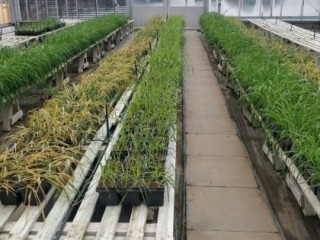
Italian ryegrass
£250 (£220 with membership discount)
Axial, ALS (Atlantis) and flufenacet
Black-grass
£250 (£220 with membership discount)
Clethodim, ALS (Atlantis) and flufenacet
Wild oats
£300 (£260 with membership discount)
Fenoxaprop/clodinafop, Axial, cycloxadim and ALS (Atlantis)
Brome species (Meadow, rye, sterile and great)
FOC for Summer 2023
ALS (Atlantis) and fenoxaprop
Broad-leaved weeds (chickweed, mayweed, poppy, bur chervil)
£200 (£160 with membership discount)
Sulfonyl-urea (metsulfuron ‘Ally’ or equivalent), synthetic auxin (2,4-D ‘Depitox’)
Costs of all herbicide resistance tests are discounted for NIAB Agronomy members. The discount is a minimum 12%, with further discount opportunities for for significant volumes of tests or under longer-term agreements.
Guide to interpreting herbicide resistance test results
Herbicide resistance testing at NIAB
NIAB is a UK focused organisation that is committed to working on weeds from the most practical farmer-led evaluation of weed management approaches in practice, large and small plot field experiments, glasshouse-based herbicide resistance testing right though to molecular diagnostics in the laboratory.
Understanding herbicide resistance nationally and using herbicide resistance testing is important. The understanding of herbicide resistance status nationally and for individual farmers is only one aspect of an Integrated Weed Management approach, and by working at a range of scales NIAB can support farmers and advisors with herbicide resistance information alongside putting those results into a broader context.
Weed ‘libraries’.
As well as the standard resistance test results indicating the level of herbicide resistance in an individual sample using standard nomenclature NIAB will always provide test results that place an individual result into context; how this sample compares to the national status of a weed. NIAB has taken the approach of building-up national libraries of weed populations to enable us to do this. Developing well characterised libraries of populations also allows us to quickly ‘screen’ for new resistance traits and as part of new product development to ‘baseline’ new active ingredients so we can understand the implications of existing herbicide resistance traits.
Working with the industry
In building up these libraries we have benefitted a great deal from the support of the industry, particularly our NIAB Agronomy members. Developing this service would not have been possible without their support so we offer a significant discount to our members. By using NIAB’s resistance testing service and by requesting that your agronomist or company representative uses our service you continue to support our development of this critical component of Integrated Weed Management.
Toward a ‘Hybrid Testing’ approach
Starting with a commercial herbicide resistance testing service in Summer 2021 NIAB undertakes standard pot-based whole plant resistance testing for all the active ingredients we test. The aim in future seasons is to build on this service and offer a ‘hybrid testing’ approach where NIAB carries out molecular diagnostics (PCR and qPCR) for active ingredients and weeds where these tests can provide definitive findings alongside pot-based whole plant tests for those actives where molecular diagnostics are not available or where the results of these diagnostics give rise to an unacceptable level of false results. As the testing continues NIAB has the capabilities to continue to refine and develop molecular diagnostics and over the longer-term more of the testing will be based on laboratory work. Critically this will only happen when we can demonstrate that this provides definitive, repeatable, representative results.
Working to the highest standards
NIAB continues to pride itself on working to the very highest standards. We hold ORETO certification for efficacy testing and have a demonstrated track record in herbicide resistance testing across a range of UK weed species. NIAB’s investment in modern glasshouse facilities and specific facilities within the glasshouse complex (include specialised watering setup) continues to improve consistency and quality. NIAB does not carry out the less expensive incubator/petri-dish based quick tests. Our belief is that whole plant pot-based testing is the best available testing providing the most consistent and representative results.
Benefiting from NIAB’s investment
NIAB continues to invest in capabilities and expertise. The MacLeod Complex - NIAB’s glasshouse and controlled environment unit at Park Farm in Cambridge - was completed in 2010, providing 2,500 m2 of specialised research glasshouse and associated resources. Development of this complex continues with new facilities being added as part of the Crop Science Centre. In its headquarters building in Cambridge NIAB has invested in molecular genetics capabilities including a high level of robotics and automation allowing for high throughput studies. This automation supports Illumina and nanopore sequencing facilities allowing us to undertake standard and bespoke qPCR and other molecular diagnostics in-house.
